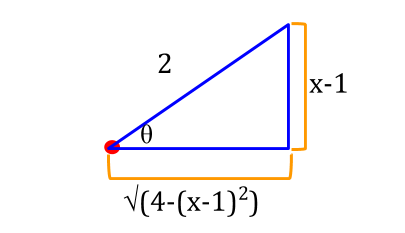We have:
#int sqrt (3+2x-x^2) dx#
Complete the square under the root:
#3+2x-x^2 = 4 - (1-x)^2 = 4 (1- ((1-x)/2)^2)#
and substitute:
#t= (1-x)/2#
#dt = -dx/2#
so that:
#int sqrt (3+2x-x^2) dx = int sqrt (4 (1- ((1-x)/2)^2))dx = 2int sqrt (1- ((1-x)/2)^2)dx = -4int sqrt(1-t^2)dt#
Substitute again:
#t = sinu#
#dt = cosu du#
and note that as the integrand is defined only for #t in [-1,1]# we have that #u in [-pi/2,pi/2]#:
#int sqrt(1-t^2)dt = int sqrt (1-sin^2u) cosu du = int sqrt (cos^2u) cosu du#
For #u in [-pi/2,pi/2]#, #cos u > 0#, then:
#int sqrt(1-t^2)dt = int cos^2udu#
Use now the trigonometric identity:
#cos^2theta = (1+cos2theta)/2#
#int cos^2udu = int (1+cos2u)/2 du = 1/2 int du + 1/4 int cos(2u)d(2u) = u/2 + sin (2u)/4+C = 1/2(u+sinucosu)+C#
Undo now the substitution:
#u = arcsint#
#sin u = t#
#cos u = sqrt(1-t^2)#
so:
#int sqrt(1-t^2)dt = 1/2(arcsint +tsqrt(1-t^2))+C#
and:
#int sqrt (3+2x-x^2) dx = -2(arcsin((1-x)/2) + ((1-x)/2)sqrt(1-((1-x)/2)^2))+C#
simplifying:
#int sqrt (3+2x-x^2) dx = 2arcsin((x-1)/2) + (x-1)/2sqrt(3+2x-x^2)+C#



